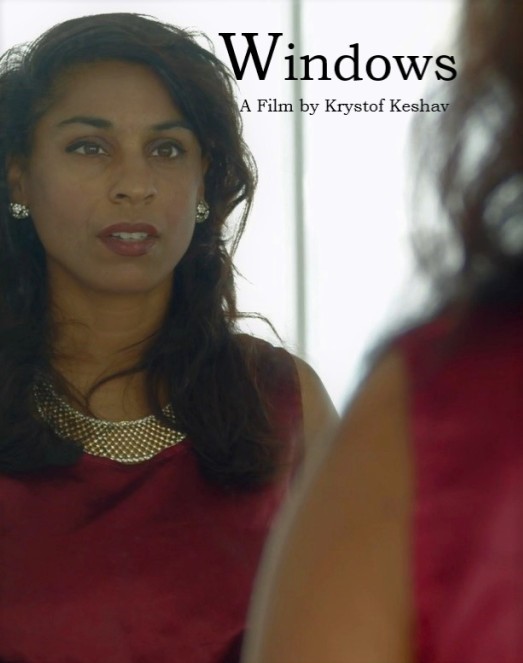Windows (2024)
A film by Krystof Keshav
Production House: Sene Lisboa
Media and Public Relations: CMCS Media

ABOUT THE FILM
Tagline: A Bengali short with a universal twist
Logline: When a woman is stood up, she considers all the opportunities opening up to herself.
Synopsis: In the independent short film, Windows, the protagonist Amrita is a single professional woman. She returns home after an ordinary day of work, but plans an extraordinary moment with a date that night. Her mundane tasks prepare for a special moment of romance until her hopes are shattered. When her date cancels with no explanation, she feels defeated in his secretive action but also remains open in the mystery of all. An unknown note on her mobile phone triggers her to turn her adversity into an opportunity. From her mirror to her door, a window of opportunity reverses what her background denied her in the past.
Credits
Krystof Keshav Director
Krystof Keshav Writer
Samita Nandy Key Cast
Samita Nandy Interpreter
Project Specifications
- Genre: Drama
- Project Type: Short
- Runtime:4 mins 18 seconds
- Country of Origin: Portugal
- Country of Filming: Portugal
- Language: Bengali
- Shooting Format: Digital
- Aspect Ratio: 16:9
- Film Color: Color
Production Company
SENE LISBOA
Rua Garrett 26 1A,
Lisbon 1200-204 Portugal
Website & Social Media
Production
URL http://cmc-centre.com/windows-2023/
Director
Vimeo https://vimeo.com/user40315348
Actor
Twitter www.twitter.com/famecritic
Instagram www.instagram.com/samitanandyofficial
DIRECTOR’S STATEMENT
– Krystof Keshav
Windows (2023) is a powerful story with excellent interpretation, optimum sound, and well thought-out direction and cinematography.
The shoot was scheduled in a season that would be aligned with the storyline and at a time to give the appropriate natural daylight. Natural interior lighting was used to give this short film an authentic feel, rather than using external sources of lighting.
This location was chosen above several other options to fully associate with the profile of the main character. The floor finishings, the furniture design and the accessories were all meticulously selected. The scenes in the bedroom, bathroom, kitchen, and living room were all set up in a way that would follow the storyboard, and represent the character’s intentions.
Two lenses were used in this short film, with the macro lens used to focus on objects with which the actress was interacting, and thus, represent the inner workings of the character’s mind. The music was selected in a way that would give an auditory representation of the emotions of the main character. Two microphones were used to give a variety of inputs. The wardrobe was also all carefully selected so the viewer would have a clearer understanding of the character’s careful deliberation of the choices available to her. All choices were made to be able to seamlessly blend into the imagery, so the viewer would be able to feel deeply immersed into the film and identify with the character and her emotions.
The Direction and Cinematography were also carefully designed to fully showcase the deepness of the emotions the character feels. The length of each shot, the movements of each lens, and even the height at which the camera was placed were all carefully designed. Similarly, in the edition of the film: the colour grading, the sound design, and the moment of the commencement of the voiceover.
The content of the voiceover, and the message it delivers makes Windows a powerful short film, a wonderful blend of excellent interpretation, carefully thought-out cinematography and meticulous direction. It fully succeeds in finding an audience that identifies and empathises with the central character, and is a film designed to live long in the memory of each individual viewer.
Actor and Interpreter’s Statement
– Samita Nandy
The significance of Bengali language in the interpretation of Windows (2023), originally written in English by Krystof Keshav, lies in its narrative representation of post-colonial women in West Bengal since the Partition of Bengal during the Indian Independence. The modernity of Bengali women’s subjectivity, particularly in the West, as seen in Windows, reverses dominant gendered roles depicted and interrogated in early Bengali cinema in India, where both the English influences of modern elite and non-elite classes had formal but limited spaces, inscribing specific moral values for married women or unmarried girls at their homes. The punctuated use of ‘silence’ in contested spaces of domesticity, as seen in classic Bengali films, such as Satyajit Ray’s Devi, Charulata, and Ghare Baire, allowed the necessary portrayal of gestural and postural expressions of tensions and negotiations of unfulfilled desires by educated women at patriarchal homes at that time. Windows has two linguistic versions – Bengali and English along with silence and voice-over that symbolize the complex cultural background but also its departure from past norms. In addition to the use of ‘silence’, Windows (2023) contributes to narrative shifts of modern Bengali representations by using ‘voice-over’ to mark inner questions raised by the Bengali female lead, also the interpreter of the film. The economic independence of her single-professional character, Amrita, inviting a male date to her self-managed home, re-writes a history of patriarchal narratives that often continue in conservative areas. In fact, like the Bengali actor’s film The Leak (2022), the invitation of a male date at home unsettles long traditions, prohibiting women from making free choices of desire and liberates men, bearing sole responsibility of paying for romantic dinners at restaurants.
The short length of Windows (4 mins 18 secs) shows the swiftness of the female lead’s empowerment and freedom to listen to her inner voice as opposed to hours of longings and trauma in earlier Bengali cinema. The transnational setting in Portugal happens to overlap with the cities of Mumbai and Goa that carry Portuguese origins and stories of liberal men and women, now also visible in other modern Indian cities and expat South Asian spaces. Nevertheless, as researcher and journalist Sohini Chattopadhyay observes, many Bollywood films on the Independence movement or Partition, such as 1942: A Love Story, Lagaan, and Mangal Pandey, reiterate male-centric heroism in India, overshadowing the many fights and victories of women leaders and supporters. Despite victories in modern Bengali culture in India, including the 19th-century reforms for widow burning and child brides, many women still carry internalized sexism and gaslighting to negotiate their tensions in patriarchy. Sohini Chattopadhyay specifically notes:
West Bengal recorded the highest number of cases of domestic violence against women, according to the National Crime Records Bureau report for 2016, the highest number of acid attacks and acid attack attempts, and the second highest number of crimes against women overall. (https://sohinichattopadhyay.com/2019/07/are-independence-and-partition-male-experiences/ )
We sincerely hope Windows offers representation and inspiration for women and men’s freedom, transformation, and resolutions, thereby contributing to a cinematic lens of inquiry for life choices.
BIOGRAPHIES




Krystof Keshav – Director & Writer
Krystof Keshav is an independent filmmaker based in Lisbon, Portugal. As an amateur actor, he found himself working as a figurante in films and adverts across Europe, or acting in short independent films, where he did not have a real say in the synopsis or the final script. When he approached Directors with his own synopsis or script, he found it extremely difficult to have his short film produced. So, falling back on previous courses in photography, film studies, and 16mm Film-making, he boot-strapped and became an independent Director. His filmography includes festival film Derradeiro O Passo, screened at Cinema Sao George, among many others.
Vimeo: https://vimeo.com/user40315348




Samita Nandy, PhD – Actor and Interpreter
Samita Nandy is the Founder of the Centre for Media and Celebrity Studies (CMCS) and an actor, trained from the American Academy of Dramatic Arts (Los Angeles). She holds a Doctorate in celebrity culture from the Department of Media & Information at Curtin University, Australia, and is a certified broadcast journalist from Canada. Samita Nandy is the first celebrity scholar to be in the tabloid press and has been publicized in a wide range of media, including CBC National News, Global News, Telegraph, VICE, Flare, Chatelaine, SUN, and Yahoo! Entertainment for her ethical views on film actors in celebrity culture. Her filmography includes The Critic (under production), The Leak, Derradeiro O Passo, Between Doors, and more.
IMDB: www.imdb.me/samitanandy
Media: http://samitanandy.com/media
Interview: Re-fashioning stories through feminist filmmaking, an interview with Samita Nandy (Intellect Books)
Media and Public Relations:
Centre for Media and Celebrity Studies (CMCS)
110 Cumberland St.
Suite 610
Toronto, ON M5R 3V5 Canada
T: 647-947-3632 | E: info@cmc-centre.com
https://www.youtube.com/watch?v=gh1By4DfJiM&feature=youtu.be (private for festival release)





Recent Comments